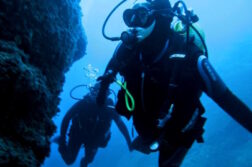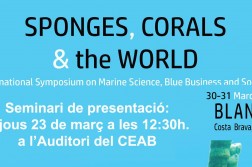Coastal marine ecosystems attenuate the effects of greenhouse gas emissions to the atmosphere by sequestering large amounts of carbon. However, these systems also export over 40% of their primary production as organic carbon to the open ocean, approximately half of the carbon exported is in the form of dissolved organic matter (DOM). Existing research on coastal blue carbon focuses on carbon sequestration as plant biomass whereas the mechanisms that control DOM export and the processes that transform DOM and sequestrate it into recalcitrant DOM (RDOM) are largely overlooked.
This proposal is motivated by the need to narrow this knowledge gap by focusing on the role of metazoans in DOM transformation and cycling. As the first step in this direction, we propose to focus on the Porifera since, among the benthic metazoans, sponges are prominent in their ability to consume large amounts of DOM. We propose to examine and quantify the three fundamental knowledge gaps needed to assess the role of sponge populations as a benthic carbon pump, comparable to the oceanic ‘microbial carbon pump’:
- The metabolic demand of sponges and the organic carbon, O2, and CO2 fluxes they mediate;
- The rate by which sponges transform organic matter into labile or RDOM;
- The efficiency of sponges to remove volatile organic compounds (VOCs) in the coastal zone. We will address these questions by direct and concurrent in-situ measurements of oxygen and DOM consumption and CO2 and DOM production by individual sponges; these will allow us to determine the extent by which metabolic processes other than nitrification may be affecting oxygen consumption as well as to quantify the amount of CO2 that would escape into the atmosphere.
We will also study the fate of the DOM released by sponges and the production of RDOM, therefore, contributing to the long-term carbon sequestration of CO2 in the ocean.
Finally, we propose to examine the role of sponges in controlling the fate of the so far overlooked VOCs; evaluating the role of marine sponges as bio-remediators for these compounds is important since despite their low concentration, once released, they can have dramatic planetary-scale consequences. Identification of new carbon sinks and VOCs bio-remediation pathways are important to our understanding of the dynamic of the coastal zones, especially since these ecosystems are being degraded and destroyed at a faster rate than most terrestrial ecosystems.
The conservation and rehabilitation of coastal areas provide one of the best win-win mitigation efforts known today in our effort to adapt to the consequences of climate change.




